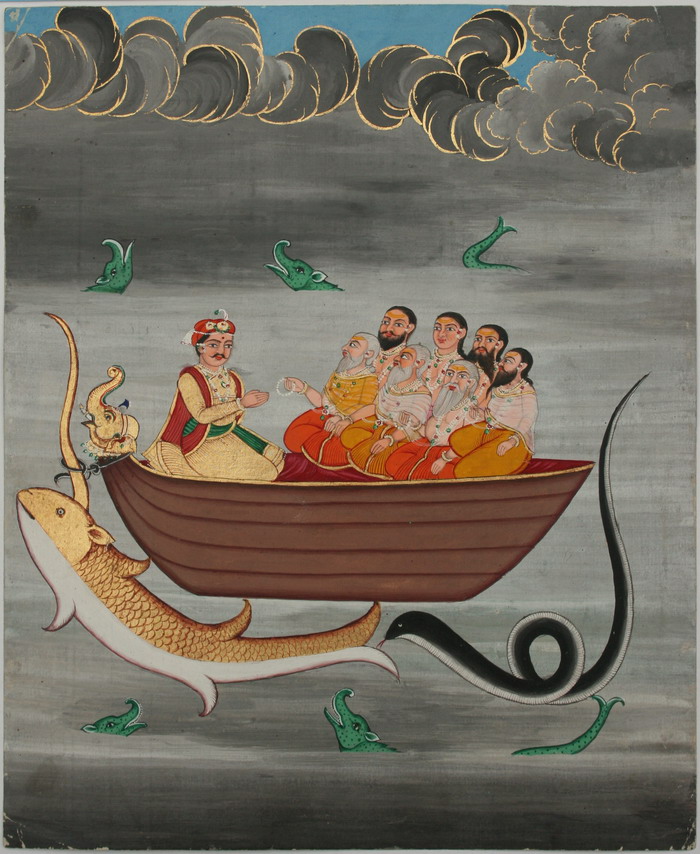|
Kutsa
Kutsa is a heroic figure of the Rigveda. Rigveda Kutsa appears in the Rigveda The ''Rigveda'' or ''Rig Veda'' ( ', from ' "praise" and ' "knowledge") is an ancient Indian collection of Vedic Sanskrit hymns (''sūktas''). It is one of the four sacred canonical Hindu texts (''śruti'') known as the Vedas. Only one Sh ... as a heroic figure who is associated with Indra's defeat of the demon Śuṣṇa and the winning of the sun. He, along with Atithigva and Āyu, are also known to have been defeated by Indra, an act at one point attributed to Tūrvayāṇa. At other points Kutsa and Atithigva are known to be friends of Indra. According to Hillebrandt, the two views on Kutsa's friendly or adversarial relations with Indra can be resolved by postulating that the Rigveda refers to two separate Kutsas. At one point in the Rigveda, Kutsa stated to have defeated Smadibha, Tugra, and the Vetasus. Kutsa is stated to be a descendant of Arjuna. References {{DEFAULTSORT:Kutsa ... [...More Info...] [...Related Items...] OR: [Wikipedia] [Google] [Baidu] |
Indra
Indra (; Sanskrit: इन्द्र) is the king of the devas (god-like deities) and Svarga (heaven) in Hindu mythology. He is associated with the sky, lightning, weather, thunder, storms, rains, river flows, and war. volumes/ref> Indra's myths and powers are similar to other Indo-European deities such as Jupiter, Perun, Perkūnas, Zalmoxis, Taranis, Zeus, and Thor, part of the greater Proto-Indo-European mythology. Indra is the most referred deity in the ''Rigveda''. He is celebrated for his powers, and as the one who killed the great evil (a malevolent type of asura) named Vritra, who obstructed human prosperity and happiness. Indra destroys Vritra and his "deceiving forces", and thereby brings rains and sunshine as the saviour of mankind. He is also an important deity worshipped by the Kalash people, indicating his prominence in ancient Hinduism. Indra's significance diminishes in the post-Vedic Indian literature, but he still plays an important role in various m ... [...More Info...] [...Related Items...] OR: [Wikipedia] [Google] [Baidu] |
Susna
Shushna () is an asura described in Hindu texts. Normally associated with drought, Shushna is often described as possessing a snake-like form with horns. He is an enemy of the deity Indra. Etymology Shushna means "drought" from the root Sus, which translates to "dry up". The similar "sosna" is an old Slavic word for the pine tree. Literature In Hinduism, Shushna is an asura commonly associated with drought, famine, and hoarding.Chakravarty, U. (1994). INDRA'S PROTÉGÉS IN THE ṚGVEDA. ''Annals of the Bhandarkar Oriental Research Institute,'' ''75''(1/4), 51-64. Retrieved from http://www.jstor.org/stable/41694405 An enemy of Indra, the asura makes multiple appearances across a number of Vedic texts. He is often associated with Vritra, another asura which obstructs the rivers of the world. In the Brahmana and Yajurveda texts within the Vedas, Shushna is described as being a bitter enemy (''dasa'') of the god Indra. Shushna, who is described as a horned serpent-asura, aids the ... [...More Info...] [...Related Items...] OR: [Wikipedia] [Google] [Baidu] |
Rigveda
The ''Rigveda'' or ''Rig Veda'' ( ', from ' "praise" and ' "knowledge") is an ancient Indian collection of Vedic Sanskrit hymns (''sūktas''). It is one of the four sacred canonical Hindu texts (''śruti'') known as the Vedas. Only one Shakha of the many survive today, namely the Śakalya Shakha. Much of the contents contained in the remaining Shakhas are now lost or are not available in the public forum. The ''Rigveda'' is the oldest known Vedic Sanskrit text. Its early layers are among the oldest extant texts in any Indo-European language. The sounds and texts of the ''Rigveda'' have been orally transmitted since the 2nd millennium BCE. Philological and linguistic evidence indicates that the bulk of the ''Rigveda'' Samhita was composed in the northwestern region of the Indian subcontinent (see) Rigvedic rivers), most likely between 1500 and 1000 BCE, although a wider approximation of 19001200 BCE has also been given. The text is layered, consisting of the ... [...More Info...] [...Related Items...] OR: [Wikipedia] [Google] [Baidu] |
Turvayana
Turvayana was a young Paktha king who is referred to in the ancient Hindu '' Rig Veda'' text. edited by Ralph Thomas Hotchkin Griffith, Jagdish Lal Shastri, Published by Motilal Banarsidas, See also *Chyavana
Chyavana () was a sage (rishi) in Hinduism. He was a son of Bhrigu, also known as Bhrigu Varuni in the Upanishads, and is known for his rejuvenation through a special herbal paste or tonic known as '' chyavanaprasham'', which was prepared by t ...
* Battle of the Ten Kings
Refere ...
|
Rishis
''Rishi'' () is a term for an accomplished and enlightened person. They find mentions in various Vedic texts. Rishis are believed to have composed hymns of the Vedas. The Post-Vedic tradition of Hinduism regards the rishis as "great yogis" or "sages" who after intense meditation (tapas) realized the supreme truth and eternal knowledge, which they composed into hymns.Hartmut Scharfe (2002), Handbook of Oriental Studies, BRILL Academic, , pp. 13–15. The term appears in Pali literature as Ishi and in Buddhism, they can be either Buddhas, Paccekabuddhas, Arahats or a monk of high rank. Etymology According to Indian tradition, the word may be derived from two different meanings of the root 'rsh' (). Sanskrit grammarians derive this word from the second meaning: "to go, to move". V. S. Apte gives this particular meaning and derivation, and Monier-Williams also gives the same, with some qualification. Another form of this root means "to flow, to move near by flowing". (All the ... [...More Info...] [...Related Items...] OR: [Wikipedia] [Google] [Baidu] |
.jpg)
.png)
